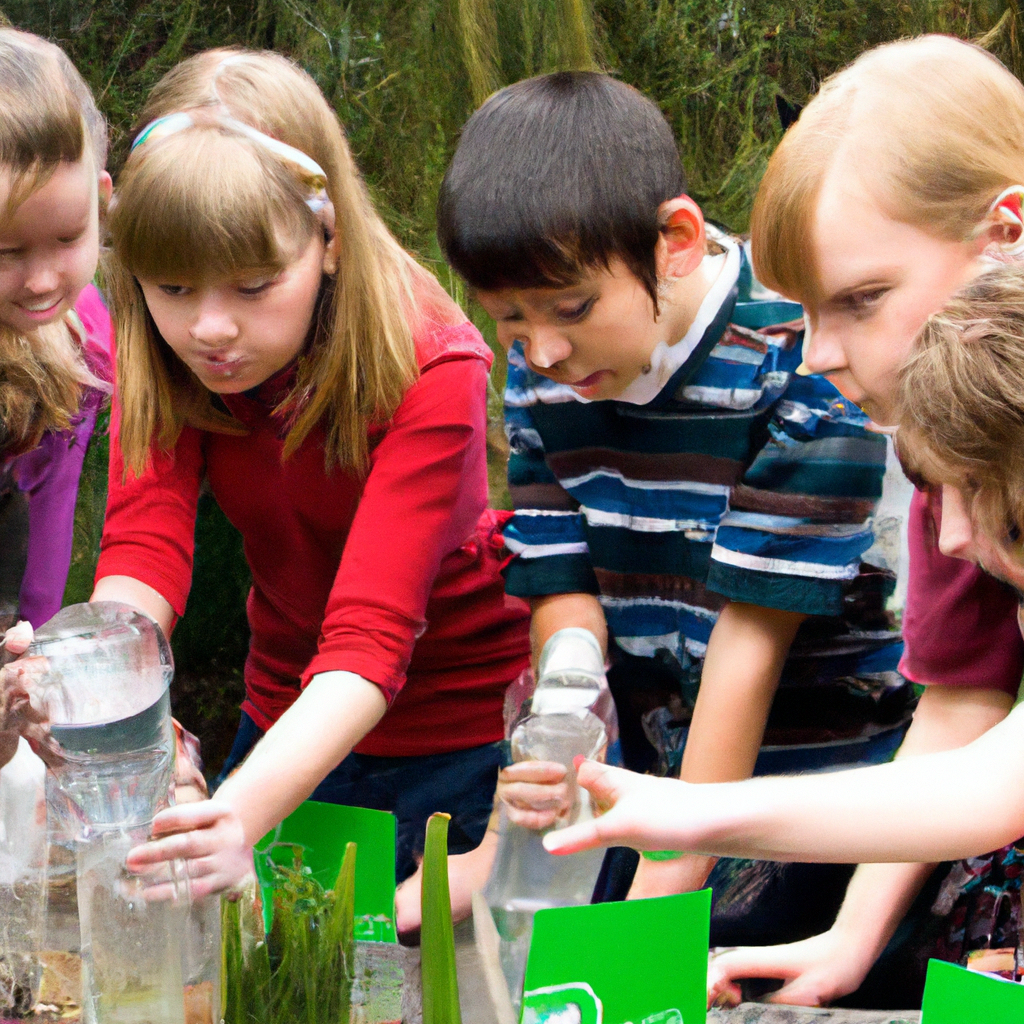In today’s fast-paced world, where environmental concerns are growing, it has become imperative for schools to play a significant role in promoting eco-friendly practices. Our article explores the various ways in which educational institutions can foster a culture of sustainability and instill eco-consciousness in students. By incorporating green initiatives, implementing eco-friendly policies, and integrating environmental education into the curriculum, schools can shape the minds of the future generation towards a more sustainable and responsible future.
Check Out Our Top Eco Friendly Product Picks On Amazon Here
Implementing Sustainable Infrastructure
Installing solar panels
Installing solar panels on school buildings is a great way to harness clean and renewable energy. By utilizing the power of the sun, schools can significantly reduce their dependence on fossil fuels and decrease their carbon footprint. Solar panels can generate electricity to power not only the school’s operations but also provide excess energy that can be fed back into the grid. This sustainable infrastructure not only saves money on electricity bills but also serves as a visible symbol of the school’s commitment to the environment.
Using energy-efficient lighting
Switching to energy-efficient lighting is another effective way for schools to improve their sustainability. LED lights, for example, consume significantly less energy compared to traditional incandescent bulbs. By replacing outdated lighting systems with LEDs, schools can reduce their electricity consumption, lower greenhouse gas emissions, and save money in the long run. Additionally, LED lights have a longer lifespan, reducing the frequency of replacements and further reducing waste.
Implementing rainwater harvesting systems
Rainwater harvesting systems allow schools to collect and store rainwater for various purposes, such as landscape irrigation, flushing toilets, and even for drinking water in certain cases. By harnessing the natural resource of rainwater, schools can reduce their reliance on treated water, which is often energy-intensive to produce. Installing rainwater harvesting systems not only promotes water conservation but also helps to relieve the strain on local water supplies, especially in areas prone to drought. This sustainable infrastructure investment helps schools become more self-sufficient and environmentally conscious.
Encouraging Waste Reduction
Promoting recycling initiatives
Schools can play a crucial role in promoting recycling initiatives among students, staff, and the wider community. By providing recycling bins throughout the campus and educating everyone about the importance of recycling, schools can create a culture of waste reduction. Implementing recycling programs not only diverts waste from landfills but also conserves resources by enabling the reuse of materials. Schools can collaborate with local recycling centers or organizations to ensure that recyclables are properly collected, sorted, and processed.
Reducing paper usage
In the digital age, reducing paper usage is a key focus for eco-friendly practices in schools. By implementing strategies such as double-sided printing, using electronic communication for notices and newsletters, and encouraging the use of digital textbooks and resources, schools can significantly decrease their paper consumption. Additionally, schools can provide students with opportunities to submit assignments electronically and promote the use of digital platforms for collaborative work. Reducing paper usage helps conserve trees and reduce waste generation, making it an essential aspect of sustainability efforts.
Composting waste materials
Composting is a natural process that transforms organic waste materials, such as food scraps and yard trimmings, into nutrient-rich soil amendments. Schools can implement composting programs to divert organic waste from landfills and create a valuable resource for their gardens or outdoor spaces. By educating students and staff about composting, schools can inspire individuals to reduce food waste and contribute to a more sustainable ecosystem. Composting also serves as a hands-on learning experience, teaching students about the importance of nutrient cycles and the benefits of organic waste management.

Check Out Our Top Eco Friendly Product Picks On Amazon Here
Promoting Water Conservation
Educating students about water conservation
Water is a precious resource, and schools can help instill a sense of responsibility in students by educating them about the importance of water conservation. Teachers can incorporate water conservation lessons into their curriculum, discussing topics such as the water cycle, water scarcity, and the impact of human activities on water resources. Students can also be encouraged to take simple actions, like turning off faucets while not in use, reporting leaks, and using water-saving techniques in their daily routines. By cultivating a water-conscious mindset, schools can create a lasting impact on students’ behavior and contribute to a sustainable future.
Installing low-flow faucets and toilets
Installing low-flow faucets and toilets is an effective strategy to reduce water consumption in schools. These fixtures are designed to limit the amount of water flow without compromising functionality. By replacing traditional faucets and toilets with low-flow alternatives, schools can save a significant amount of water each year. Additionally, incorporating motion-sensor faucets and dual-flush toilets further enhances water conservation efforts. These sustainable infrastructure upgrades not only reduce water bills but also promote responsible water usage among students and staff.
Collecting rainwater for irrigation
Another way schools can conserve water is by collecting rainwater for irrigation purposes. By installing rain barrels or cisterns, schools can capture and store rainwater, which can then be used to water gardens, sports fields, or for other non-potable uses. This reduces the reliance on treated water and minimizes the strain on local water supplies, especially during dry seasons. Schools can also integrate rainwater harvesting into their educational programs, teaching students about the importance of water conservation and sustainable water management practices.
Creating Sustainable Gardens
Establishing school gardens to grow produce
Creating school gardens provides a hands-on, educational opportunity for students to learn about sustainable agriculture and nutrition. By establishing gardens on school grounds, students can actively participate in growing fruits, vegetables, and herbs. This not only promotes a healthier lifestyle but also reduces food miles and fosters a connection with nature. Students can learn about organic gardening practices, plant life cycles, and the importance of biodiversity. School gardens also provide a platform for cross-curricular learning, integrating subjects such as science, math, and even art.
Implementing organic farming practices
To ensure the sustainability of school gardens, it is crucial to implement organic farming practices. Avoiding the use of synthetic fertilizers, pesticides, and herbicides not only protects the environment but also promotes the health of the soil, plants, and the people consuming the produce. Composting organic waste from the school cafeteria or garden trimmings can also provide a valuable source of nutrients for the garden. By choosing organic growing methods, schools can create a safe and thriving ecosystem within their gardens.
Including composting in garden maintenance
Composting plays a vital role in garden maintenance and overall sustainability. By composting organic matter, schools can close the nutrient loop and minimize waste. Students can learn about the composting process, the role of decomposers, and how organic waste transforms into nutrient-rich soil amendment. Composting can be integrated into the garden maintenance routine, providing a practical example of sustainability in action. Involving students in composting efforts not only reduces waste but also teaches valuable lessons about resource conservation and responsible consumption.

Offering Eco-friendly Transportation Options
Encouraging walking or biking to school
Promoting active transportation methods such as walking or biking to school is not only eco-friendly but also benefits students’ health and well-being. Schools can encourage students and their families to choose these modes of transport by organizing walking or biking events, providing safe routes, and implementing infrastructure improvements like bike lanes or bike racks. Walking or biking to school reduces car emissions, congestion, and dependence on fossil fuels. It also promotes physical activity and a sense of community among students and their families.
Organizing carpool programs
For those who live further away from school, carpooling provides a sustainable transportation alternative. Schools can facilitate carpool programs by connecting families who live in the same area and offering incentives such as priority parking or reduced fees for carpool participants. Carpooling reduces the number of vehicles on the road, decreases traffic congestion, and lowers greenhouse gas emissions. It also promotes social connections and reduces transportation costs for families.
Using electric or hybrid school buses
School transportation is a significant contributor to carbon emissions, but schools can mitigate this impact by transitioning to electric or hybrid school buses. These vehicles produce fewer greenhouse gas emissions and reduce noise pollution compared to traditional diesel buses. Investing in electric or hybrid school buses not only provides a cleaner and quieter mode of transport for students but also demonstrates the school’s commitment to sustainability. Grants or partnerships with local government agencies or organizations can help schools overcome the initial costs associated with purchasing electric or hybrid buses.
Incorporating Environmental Education
Including environmental topics in the curriculum
Integrating environmental topics into the curriculum allows schools to foster environmental literacy among students. By incorporating subjects such as climate change, biodiversity, and sustainability into various subjects, schools can provide a well-rounded education centered on ecological awareness. Teachers can incorporate hands-on activities, field studies, and projects that encourage critical thinking and problem-solving skills. Environmental education empowers students to become informed and engaged citizens who are equipped to tackle environmental challenges and make sustainable choices.
Organizing field trips to eco-friendly facilities
Field trips to eco-friendly facilities, such as renewable energy farms, recycling centers, or nature reserves, provide students with real-world examples of sustainable practices in action. These field trips offer valuable learning experiences, allowing students to witness firsthand the positive impact of eco-friendly initiatives. Schools can collaborate with local organizations or businesses to organize these trips, ensuring that students gain a deeper understanding of sustainability and its relevance in different sectors.
Inviting guest speakers to discuss sustainable practices
Bringing in guest speakers who are experts in sustainable practices can provide students with invaluable insights and inspiration. Guest speakers can include environmental scientists, conservationists, or professionals from various fields related to sustainability. Their firsthand experiences and expertise can broaden students’ horizons and expose them to a range of sustainable practices, careers, and opportunities. Guest speakers can also engage students in discussions, answer questions, and serve as role models for aspiring environmental enthusiasts.

Engaging the School Community
Organizing eco-friendly events and campaigns
Organizing eco-friendly events and campaigns offers opportunities for the entire school community to come together and actively participate in sustainability efforts. Schools can arrange events such as Earth Day celebrations, waste reduction challenges, or clean-up drives. These events not only educate and raise awareness about ecological issues but also create a sense of unity and pride within the school community. Involving students, staff, parents, and even local businesses in these initiatives promotes a collaborative approach to sustainability and can yield impactful and lasting results.
Establishing student-led environmental clubs
Student-led environmental clubs provide a platform for students to take ownership of sustainability initiatives and drive positive change within their school community. These clubs can organize regular meetings, plan and implement eco-friendly projects, and raise awareness about environmental issues. By empowering students to become leaders in sustainability, schools not only foster a sense of responsibility and active citizenship but also tap into the creativity and innovation of their students. Environmental clubs can collaborate with other school clubs, community organizations, and local businesses to maximize their impact.
Encouraging parents and staff to participate in eco-friendly initiatives
Engaging parents and staff in eco-friendly initiatives is essential for creating a sustainable school community. Schools can encourage parents to adopt sustainable practices at home, such as reducing energy consumption, practicing waste reduction, or incorporating eco-friendly transportation methods. Additionally, schools can organize workshops or information sessions for staff to learn about sustainable practices in their areas of work, whether it is in the classroom, cafeteria, or maintenance. Involving parents and staff cultivates a culture of sustainability, both within and outside the school premises, and promotes a holistic approach to eco-friendly practices.
Collaborating with Local Organizations
Partnering with local environmental organizations
Collaborating with local environmental organizations is a valuable way for schools to expand their sustainability efforts and benefit from the expertise and resources available in their community. These organizations can provide guidance, training, or even funding opportunities for eco-friendly projects or initiatives. Schools can establish partnerships with environmental nonprofits, conservation groups, or community organizations to leverage support and create a more significant impact on the local environment. By working together, schools and local organizations can foster stronger environmental stewardship within the community.
Participating in community clean-up initiatives
Participating in community clean-up initiatives allows schools to actively contribute to the cleanliness and well-being of their surrounding environment. Schools can organize clean-up events in collaboration with local government agencies, nonprofits, or neighborhood associations. These events provide students, staff, parents, and community members with an opportunity to get involved and make a tangible difference. Participating in clean-up initiatives not only improves the aesthetic appeal of the community but also raises awareness about the importance of waste management and encourages responsible behavior among participants.
Supporting local eco-friendly businesses
By supporting local eco-friendly businesses, schools can contribute to the sustainable development of their community. Schools can choose to purchase environmentally friendly products or services from local businesses that prioritize sustainability. This includes items such as recycled paper, non-toxic cleaning supplies, or eco-friendly school supplies. Additionally, schools can collaborate with local businesses for sponsorships, donations, or partnerships in sustainability initiatives. Supporting local eco-friendly businesses not only strengthens the local economy but also promotes a sense of community and shared responsibility for the environment.

Monitoring and Reporting Eco-friendly Practices
Tracking energy and water usage
In order to monitor the effectiveness of eco-friendly practices, schools can track their energy and water usage. Keeping records of energy consumption and water usage allows schools to identify trends, pinpoint areas of improvement, and set benchmarks for a more sustainable future. Schools can use energy monitoring systems and water meters to collect data, analyze consumption patterns, and implement targeted conservation measures. Tracking energy and water usage not only helps schools optimize their resource management but also provides valuable feedback for reporting and further improvement.
Maintaining waste management records
Maintaining waste management records is crucial for assessing the success of waste reduction and recycling programs. Schools can keep track of the types and quantities of waste generated, the percentage of waste diverted for recycling, and any cost-saving measures related to waste management. These records enable schools to identify areas where additional efforts are needed, modify existing practices, and celebrate achievements. Additionally, waste management records can be used to educate students, staff, and the community about the importance of responsible waste disposal and the benefits of recycling.
Sharing progress and achievements with the school community
Sharing progress and achievements in eco-friendly practices is essential for fostering a sense of pride and encouraging ongoing engagement within the school community. Schools can regularly communicate updates on sustainability initiatives through newsletters, notice boards, or school websites. Sharing success stories, statistics, and student testimonials can inspire others to get involved and motivate them to contribute to the school’s sustainability goals. Additionally, schools can organize events or assemblies to celebrate milestones and recognize individuals or groups for their efforts in promoting eco-friendly practices. By highlighting accomplishments, schools can create a positive narrative around sustainability and inspire further action.
Securing Funding for Sustainability Projects
Applying for grants and sponsorships
Securing funding for sustainability projects can be achieved through various channels, including grants and sponsorships. Schools can research and apply for grants specifically aimed at supporting environmental initiatives in educational institutions. Additionally, reaching out to local businesses, corporations, or community organizations for sponsorships can provide financial support and resources for sustainability projects. Forming partnerships with these entities not only helps schools fund their eco-friendly initiatives but also promotes community engagement and raises awareness about the importance of environmental education.
Organizing fundraisers for eco-friendly initiatives
Organizing fundraisers dedicated to eco-friendly initiatives creates an opportunity for the school community to come together and contribute to sustainability efforts. Schools can plan events such as eco-themed fairs, bake sales, or auctions, where the proceeds go towards funding sustainable projects. These fundraisers not only provide financial support but also raise awareness about eco-friendly practices and generate enthusiasm among students, staff, parents, and the local community. By involving everyone in the fundraising process, schools can foster a sense of ownership and collective responsibility for sustainability.
Seeking support from local businesses and government agencies
Seeking support from local businesses and government agencies is a strategic approach to securing funding and resources for sustainability projects. Schools can initiate conversations with local businesses or government representatives, sharing their vision for eco-friendly practices and their commitment to sustainability. These entities may be willing to contribute through financial support, in-kind donations, or technical expertise. Collaborating with local businesses and government agencies not only strengthens relationships within the community but also enhances the school’s capacity to implement eco-friendly initiatives effectively.
Check Out Our Top Eco Friendly Product Picks On Amazon Here




